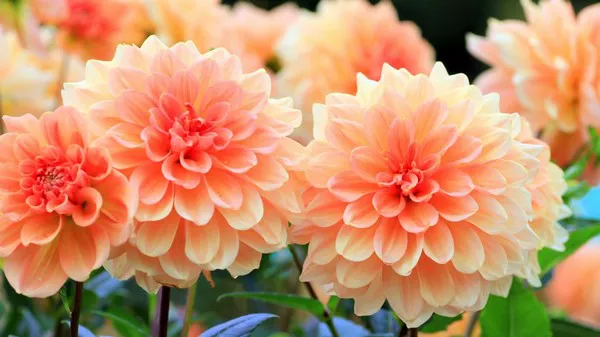Gardening enthusiasts often face the challenge of pests invading their carefully tended flower beds. While chemical pesticides can effectively control bugs, they come with potential risks to human health and the environment. Fortunately, nature provides a solution in the form of certain flowers that naturally repel insects. By incorporating these bug-deterring blooms into your garden, you can enjoy a pest-free environment without resorting to harmful chemicals. In this article, we’ll explore 10 flowers renowned for their ability to keep bugs away.
1. Marigolds (Tagetes spp.)
Marigolds are perhaps one of the most popular choices for pest control in gardens. Their strong fragrance, attributed to compounds like limonene and alpha-terthienyl, helps repel mosquitoes, aphids, whiteflies, and other insects. Planting marigolds around vegetable crops can deter nematodes in the soil, protecting the plants from these microscopic pests. These colorful annuals thrive in full sun and well-drained soil, making them an ideal addition to any garden.
2. Lavender (Lavandula spp.)
Lavender not only adds beauty and fragrance to your garden but also serves as a natural insect repellent. Its aromatic oils, particularly linalool and linalyl acetate, repel mosquitoes, flies, moths, and fleas. Placing dried lavender sachets in closets and drawers can also help keep clothes moths at bay. This drought-tolerant perennial prefers sunny locations with well-drained soil and is a favorite among pollinators such as bees and butterflies.
3. Chrysanthemums (Chrysanthemum spp.)
Chrysanthemums contain pyrethrin, a natural insecticide commonly used in commercial bug repellents. This compound is highly effective against mosquitoes, roaches, ants, ticks, and fleas. While chrysanthemums are often cultivated as annuals, some varieties are hardy perennials in certain climates. These colorful flowers thrive in full sun and well-drained soil, making them a valuable addition to any pest-resistant garden.
4. Petunias (Petunia spp.)
Petunias not only brighten up garden spaces with their vibrant blooms but also help repel aphids, tomato hornworms, and other common garden pests. Their sticky hairs and natural insecticidal properties make them an effective deterrent against various insects. Petunias come in a wide range of colors and are easy to grow, making them a popular choice for both novice and experienced gardeners alike.
5. Nasturtiums (Tropaeolum majus)
Nasturtiums are not only edible flowers but also excellent companion plants for repelling pests. Their pungent odor deters aphids, whiteflies, squash bugs, and cucumber beetles. Additionally, nasturtiums act as a trap crop, attracting aphids away from more valuable plants. These colorful annuals thrive in full sun to partial shade and are known for their cascading growth habit, making them perfect for hanging baskets and container gardens.
6. Rosemary (Rosmarinus officinalis)
Rosemary is a versatile herb that not only adds flavor to culinary dishes but also helps repel mosquitoes, flies, and cabbage moths. Its fragrant foliage contains oils like camphor and cineole, which have insect-repellent properties. Planting rosemary around outdoor seating areas can help create a bug-free zone for relaxation and enjoyment. This drought-tolerant perennial prefers well-drained soil and thrives in sunny locations.
7. Basil (Ocimum basilicum)
Basil is another culinary herb that doubles as a natural insect repellent. Its strong aroma, attributed to compounds like eugenol and citronellol, repels mosquitoes, flies, and thrips. Planting basil around tomato plants can help deter hornworms and aphids, protecting the tomatoes from damage. This annual herb prefers warm temperatures and well-drained soil, making it an excellent addition to vegetable gardens and herb beds.
8. Geraniums (Pelargonium spp.)
Geraniums are popular bedding plants known for their colorful blooms and strong fragrance. Their scent, derived from compounds like geraniol and citronellol, repels mosquitoes, flies, and Japanese beetles. Planting geraniums around outdoor seating areas can help create a bug-free environment for relaxation and entertainment. These heat-tolerant annuals prefer full sun to partial shade and well-drained soil.
9. Calendula (Calendula officinalis)
Calendula, also known as pot marigold, is valued not only for its bright flowers but also for its insect-repellent properties. Its strong aroma deters aphids, whiteflies, and tomato hornworms, making it a valuable companion plant in vegetable gardens. Calendula blooms continuously throughout the growing season and attracts beneficial insects such as ladybugs and hoverflies. This easy-to-grow annual prefers full sun and well-drained soil.
10. Alliums (Allium spp.)
Alliums, which include onions, garlic, and chives, not only add flavor to culinary dishes but also help repel a wide range of pests. Their pungent odor deters aphids, carrot flies, and cabbage worms, protecting nearby plants from damage. Planting alliums among susceptible crops can help provide natural pest control in the garden. These hardy perennials prefer full sun and well-drained soil and are a staple in vegetable gardens.
Conclusion
Incorporating these 10 bug-repelling flowers into your garden not only enhances its beauty but also provides a natural and effective means of pest control. By harnessing the power of nature’s own defenses, you can enjoy a thriving garden free from harmful chemicals and pesky insects. So, roll up your sleeves, put on your gardening gloves, and get ready to create a vibrant and pest-resistant oasis in your backyard.


